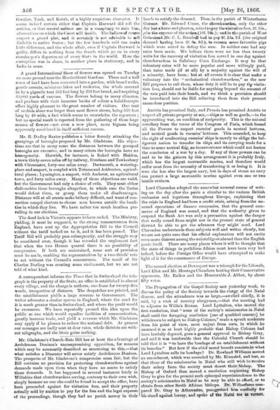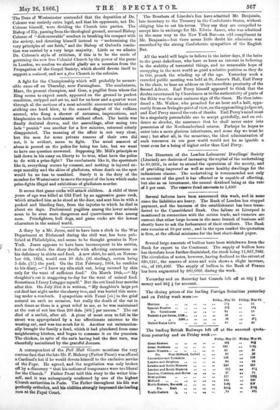The Propagation of the Gospel Society met yesterday week, to
discuss the policy of the Society towards the clergy of the Natal diocese, and the attendance was so large,—swelled chiefly, it is said, by a rush of country clergymen,--that the meeting had to adjouru to Willis's Rooms. Lord Lyttelton, who moved the first resolution, that "none of the society's missionaries in Natal shall until the foregoing resolution [one of qualified censure] be withdrawn be subject to Bishop Colenso," made a speech moderate from his point of view, meet unjust from ours, in which be assumed it as at least highly probable that Bishop Coleus° had been lawfully deposed, gave a general approval to Bishop Gray, and said it was intolerable that the Colonial Church should be told that it is "-to have the bondage of an establishment without its benefits." But how if the chief moral benefit emasiate in what Lord Lyttelton calls it bondage? Dr. Rowland Williams moved an amendment, which was seconded by Mr. Kinnaird, and lost, so that those of the missionaries in Natal who still wish to receive their salary from the society must desert their bishop. The Bishop of Oxford then moved a resolution requesting Bishop Gray to give for the present Buell episcopal superintendence to the society's missionaries in Natal as he may be able to afford, or to obtain from other South African bishops. Dr. Wilberforce com- pared Dr. Gray to Athanasias, panernized him cordially for his stand against heresy, and spoke of the Natal see as vacant. The Dean of Westminster contended that the deposition of Dr. Coleus° was entirely extra legal, and that his opponents, not Dr. Colenso himself, were dividing the Church into parties. The Bishop of Ely, passing from the theological ground, accused Bishop Colenso of "dishonourable" conduct in breaking his compact with the society, and devoting himself instead to "undermining the very principles of our faith," and the Bishop of Oxford's resolu- tion was carried by a very large majority. Little as we admire Dr. Colenso's style of criticism, if this is to be the mode of governing the new free Colonial Church by the power of the purse in London, we confess we should gladly see a secession from the Propagation of the Gospel Society, which should devote itself to support a national, and not a free Church in the colonies.































 Previous page
Previous page